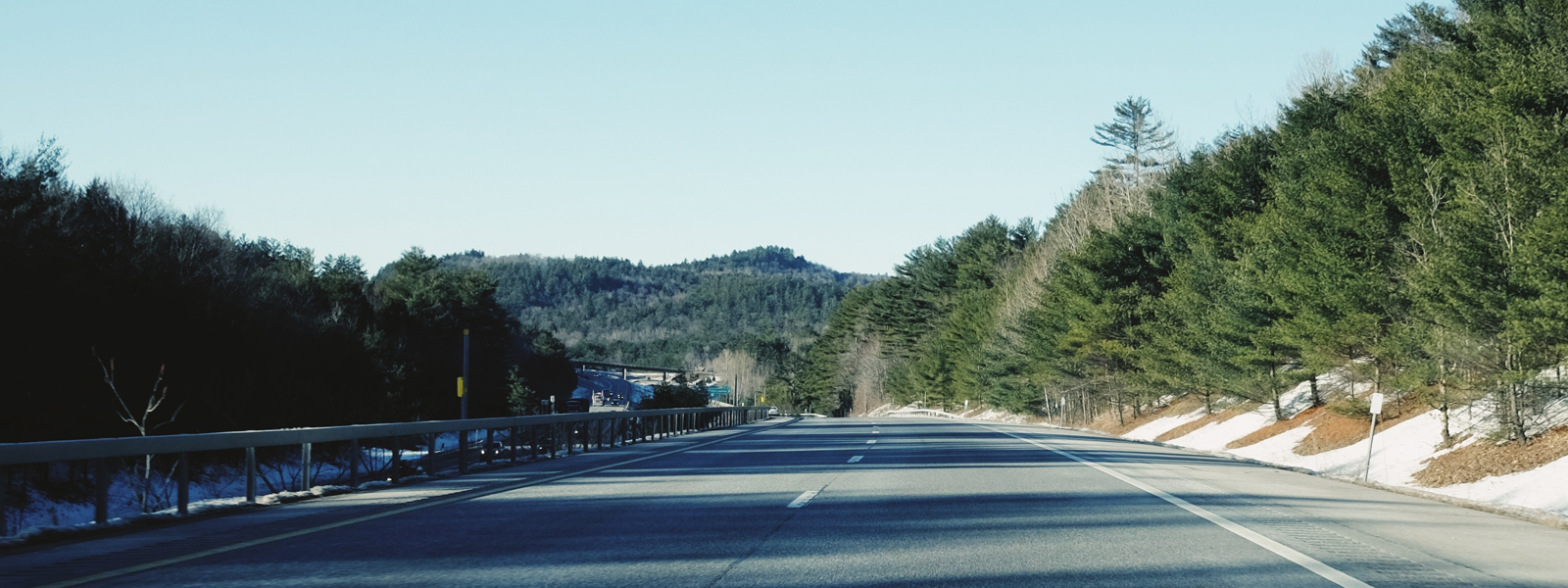Westbound on the Mass Pike, with Cheryl and friends of ancient standing, I’m destined for a vacation at a woodsy cottage in the Catskills. It will be an indulgent luxury, and my anticipation is compounded with the joy of not driving and therefore not having to navigate the sclerotic reach between Worcester and I-84 at Sturbridge.
I’ve crossed Massachusetts on the Turnpike since it opened in the late ’50s, when its logo was a Pilgrim’s hat transfixed by a flint-tipped arrow. From Millbury to Westfield, it was the way we went to visit my grandparents. From children’s summer idyll-weeks with them, through my grandfather’s death, my grandmother’s incapacity, and the final breaking up of their household, our family drove the Turnpike, and not long after that Cheryl and I started using it to reach the Catskills. My memories of the road abound, and complement my memories of my grandparents. Our journeys are no less important than our destinations.
On this trip, a progressive dwindling of visual cues pushes me over a critical threshold. Trees, having grown for fifty years, finally obscure too many of my landmarks, reclaiming the vistas. My memories must fend for themselves and surface unprompted, a perilous undertaking at my age. The beach house near the Connecticut River, sand-bound as if set on a Cape Cod dune; the truck shell lettered “Birge & Hoey” rotting on the hillside field; the quarry on a New Haven Railroad branch line–lost behind the walls of an arboreal prison. As a closet tree-hugger and erstwhile swinger of birches, it bemuses me that I see this change as a betrayal. I ascribe it to deliberate malevolence that they’ve made the Turnpike a straitened canyon just like any other run of the mill interstate. With all the loose talk and internet scuttlebutt about plants communicating, I can well imagine a tree conspiracy.
It is of course cheap, delicious, soul-nourishing irony that I’m en route to spend a week in a cottage in the middle of thousands of acres of forest, and it vanquishes my spite and resentment. I redirect my bile to a more deserving target, modern American culture as displayed in Turnpike rest areas. They are filled with roiling crowds intent on performing two of the most basic biological functions as quickly as possible. Slightly incongruous diversions attempt to part travelers from their small change: a Sopranos-themed pinball game, a hand-cranked machine for crushing a souvenir message into a penny. Though functional, these unattractive hives border on the depressing, places where the smallest human civility glares. My desire to be in the woods only deepens.
We arrive at our cottage but have brought our habits and their trappings with us–tablets for email, copious alcohol, and our cellular umbilicals–making it that much harder to recreate ourselves, reflecting as they do our quotidian lives. The cottage, however, flaunts a porch and wooden rockers. Oriented to the east, in the cool morning I soak up full facial sun until it rises over the eaves–vitamin D surges through my veins. In the evening shadows move, sunlight fades from the treetops, colors recede. I watch the full moon rise through the trees until I’m faint from mosquito-driven blood loss.
The porch abuts a substantial clearing in the forest–a golf course. The game carries baggage. It’s a tool of both political parties for reviling the other party’s presidents as frivolous time-wasters. To the exquisitely touchy it drips white male privilege, and some argue that land is better used for anything other than a golf course. Against my better judgment I recognize that embedding the course in the woods was, decades ago, a felicitous move. It’s now part and parcel of the natural landscape, so far be it from me to despise it.
The open ridges and cliffs in the woods are vantage points where I bask in expansive, gorgeous views of the Catskills and a horizon at infinity; the golf course reveals a more intimate charm. Nestled in the woods, nature embraces it, and it’s by no means sterile. Agile tree swallows scythe through the dipteran hordes. A vulture soars in search of dead meat. A motionless hummingbird siphons nectar. Sun glints off a horizontal strand of spider silk subtly undulating in the breeze. The sky is wide open–we watch a cold front push wondrous fast-moving clouds in from the west. A syrphid fly hovers in front of the cup of black coffee I’m hoisting to my face, finds it wanting, and disappears within a thin slice of a second. My sense of time resets itself.I indulge in vicarious frustration, and a touch of schadenfreude, with the often maddening game of golf, noting the sticklers and the cheaters. Unbalanced forces and a slight asymmetry cause my rocker to move imperceptibly crabwise until I sideswipe the rocker to my right. Casualties are light. I rock for hours, toughening my butt calluses, doing nothing. Nothing. Nothing but feed my senses, nothing but contemplate.
[Originally published online: oldmanscanlon.com]
…
Biography
Ray Scanlon. Massachusetts boy. Lucky to be above ground, lucky to have grandchildren. No MFA. No novel. No extrovert. Not averse to litotes. Twitter: @oldmanscanlon. On the web: read.oldmanscanlon.com
…
Image: Alex Robert





